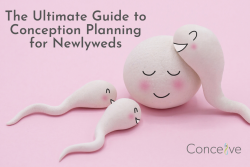There was a recent study that showed people with Neanderthal genes are more fertile.
The reason why? They had more progesterone receptors.
“In a cohort of present-day Britons, these carriers have more siblings, fewer miscarriages, and less bleeding during early pregnancy suggesting that the Neandertal progesterone receptor alleles promote fertility.”
What you need to know about progesterone receptors
Receptors are what allow hormones to do their job. Picture a lock and key: they need to fit together to work. Hormones are the key, and receptors are the lock, and when they fit, the hormone carries out its function. Progesterone’s job is to maintain the uterine lining for implantation to occur. So we need lots of progesterone receptors in the uterine lining ready to respond to the progesterone in our system.
The important thing to know is that progesterone receptors are mostly influenced by estrogen in the first half of the cycle. Estrogen is produced by a healthy growing follicle (that has the egg inside). Meaning that if we support egg quality, we support estrogen (more on that topic in my previous blog). And if we support estrogen, we support progesterone in the luteal phase.
Next, one way we influence hormone signalling naturopathically is through herbs like vitex agnus-castus (vitex). Vitex, in particular, acts on the brain to stimulate more LH (luteinizing hormone) secretion — this helps prompt ovulation, and thus the formation of the corpus luteum, which produces progesterone. So the herb itself doesn’t add hormones to your system, it helps the body make its own. Vitex also mildly influences estrogen in a modulating fashion, so it can help rebalance whether estrogen is low or whether it is high.
Other things that positively influence progesterone receptors:
- Melatonin – melatonin downregulates estrogen receptors in the uterus and upregulates progesterone receptors in the uterus.
- Vitamin D – this has been shown to increase estrogen and progesterone in human ovarian cells.
- Genetics – like our Neanderthal study above.
What things negatively impact progesterone receptors?
People who have endometriosis and fibroids have fewer progesterone receptors, or abnormal hormonal response to progesterone. (So giving progesterone is not the only treatment in these cases.)
Inflammation in the uterus also negatively affects progesterone receptors. This occurs in conditions like endometritis (chronic inflammation of the uterine lining, usually caused by bacteria/infection), or endometriosis.
Lastly, some people genetically have fewer progesterone receptors – similar to how some people carry genes that mean they have more.
Achieving healthy progesterone levels
Addressing the progesterone receptors is the other side of the coin for healthy progesterone levels. If you have had issues with low progesterone, or have not responded to progesterone supplementation, these are the other things to consider when trying to support a healthy pregnancy.
To learn more about how you can support your fertility, or to book a virtual appointment with a Conceive Health ND, contact us today.










